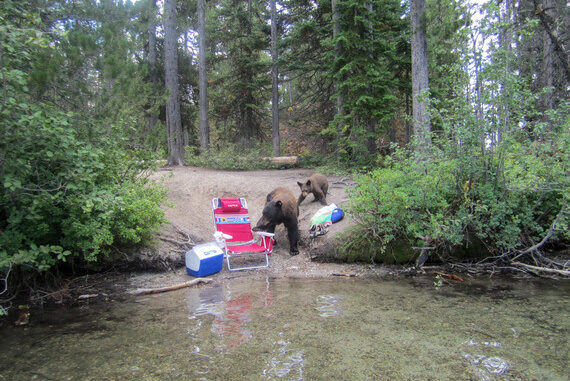
On August 11th, a black bear at Phelps Lake in Grand Teton National Park found an unattended backpack and consumed human food. This follows three other recent incidents of black bears accessing human items left along lakeshores while visitors were recreating in the water. In the last five years, almost half of all human-black bear conflicts within Grand Teton have occurred around lakes.
Proper food storage is mandatory in Grand Teton and visitors are required to properly secure all attractants for the protection of bears and other wildlife, as well as for human safety. These regulations apply whether you are camping, having a picnic, or swimming. Travelers from around the world come to Grand Teton to observe wild bears roaming across the iconic landscape. However, the opportunity to see a bear means that we have an extra responsibility to do our part to protect these animals by properly securing anything that may attract them.
When a bear is allowed to obtain human food, it can become “food-conditioned” and begin actively seeking out unnatural food. When this occurs, a bear’s behavior can become dangerously bold and a threat to public safety. If you observe a bear accessing human items or acting boldly, please report the incident to the nearest visitor center. The earlier park officials know about the bear’s behavior, the more options the park has to prevent further human-bear conflicts and avoid having to lethally remove the bear.
The solution to not creating food-conditioned bears is easy and we need your help. Take a moment to properly store all attractants, including food, coolers, clean or dirty cooking gear, pet dishes, toiletries, and anything that has a scent. Keep these items in a hard-sided vehicle with the windows rolled up or use a bear-resistant food storage locker or “bear box,” available in certain locations. If you recreate at one of the park’s lakeshores, make a plan for what you will do with your food items. You could opt to designate someone to stay with your food items or leave them in your closed vehicle. Remember to never leave your backpack farther than arm’s reach at all times. Commonly, when a bear finds human food, it involves visitors abandoning their items for just a moment – but just a moment away from your backpack can result in a bear’s death.
Be a steward for Grand Teton’s bears. Have a plan to secure your attractants when you visit the park. By each of us doing our part, we can ensure the long-term future of the park’s bear population. We can’t do it without you.
For more information on staying safe in bear country, please visit go.nps.gov/tetonbears.
